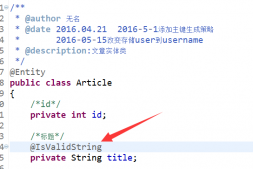Java 對(duì) Properties 文件的操作
簡(jiǎn)介
在 Java 中,我們常用 java.util.Properties.Properties 類來(lái)解析 Properties 文件,Properties 格式文件是 Java 常用的配置文件,它用來(lái)在文件中存儲(chǔ)鍵-值對(duì),其中鍵和值用等號(hào)分隔,格式如下:
|
1
|
name=shawearn |
Properties 類是 java.util.Hashtable<Object, Object> 的子類,用于鍵和值之間的映射。
在對(duì) Properties 格式文件的操作中,我們常使用 Properties 類的一下方法:
Properties():用于創(chuàng)建一個(gè)無(wú)任何屬性值 Properties 對(duì)象;
- void load(InputStream inStream):從輸入流中加載屬性列表;
- void store(OutputStream out, String comments):根據(jù)輸出流將屬性列表保存到文件中;
- String getProperty(String key):獲取指定鍵的值;
- void setProperty(String key, String value):設(shè)置指定鍵的值,若指定鍵已經(jīng)在原屬性值列表中存在,則覆蓋;若指定鍵在原屬性值列表中不存在,則新增;
寫(xiě)入 Properties 文件:
|
1
2
3
4
5
6
7
8
9
|
// 創(chuàng)建一個(gè) Properties 實(shí)例; Properties p = new Properties(); // 為 Properties 設(shè)置屬性及屬性值; p.setProperty("name", "shawearn"); p.setProperty("address", "XX 省 XX 市"); // 保存 Properties 到 shawearn.properties 文件中; FileOutputStream out = new FileOutputStream("shawearn.properties"); p.store(out, "Create by Shawearn!"); out.close(); |
讀取 Properties 文件:
|
1
2
3
4
5
6
7
|
// 創(chuàng)建一個(gè) Properties 實(shí)例; Properties p = new Properties(); // 讀取配置文件; FileInputStream in = new FileInputStream("shawearn.properties"); // 加載配置文件到 Properties 實(shí)例中; p.load(in); in.close(); |
最后附上測(cè)試代碼:
|
1
2
3
4
5
6
7
8
9
10
11
12
13
14
15
16
17
18
19
20
21
22
23
24
25
26
27
28
29
30
31
32
33
34
35
36
37
38
39
40
41
42
43
44
45
46
47
48
49
50
51
52
53
54
55
56
57
58
59
|
package com.shawearn.test; import java.io.FileInputStream; import java.io.FileOutputStream; import java.io.IOException; import java.util.Properties; import java.util.Set; /** * @author Shawearn * */public class TestProperties { /** * @param args * @throws IOException */ public static void main(String[] args) throws IOException { TestProperties t = new TestProperties(); // 測(cè)試寫(xiě)入; t.testWrite(); // 測(cè)試讀取; t.testRead(); } /* * 測(cè)試對(duì) Properties 文件的寫(xiě)入操作; */ private void testWrite() throws IOException { // 創(chuàng)建一個(gè) Properties 實(shí)例; Properties p = new Properties(); // 為 Properties 設(shè)置屬性及屬性值; p.setProperty("name", "shawearn"); p.setProperty("address", "XX 省 XX 市"); // 保存 Properties 到 shawearn.properties 文件中; FileOutputStream out = new FileOutputStream("shawearn.properties"); p.store(out, "Create by Shawearn!"); out.close(); System.out.println("寫(xiě)入成功!"); } /* * 測(cè)試對(duì) Properties 文件的讀取操作; */ private void testRead() throws IOException { // 創(chuàng)建一個(gè) Properties 實(shí)例; Properties p = new Properties(); // 讀取配置文件; FileInputStream in = new FileInputStream("shawearn.properties"); // 加載配置文件到 Properties 實(shí)例中; p.load(in); in.close(); // 獲取 Properties 文件中所有的 key; Set<String> keys = p.stringPropertyNames(); // 遍歷所有的 key; for (String key : keys) { // 獲取 Properties 文件中 key 所對(duì)應(yīng)的 value; Object value = p.get(key); // 輸入 key 和對(duì)應(yīng)的 value; System.out.println(key + " => " + value); } } } |
控制臺(tái)輸出結(jié)果:
|
1
2
|
address => XX 省 XX 市 name => shawearn |
shawearn.properties 文件內(nèi)容:
|
1
2
3
4
|
#Create by Shawearn! #Thu Nov 19 12:43:41 CST 2015name=shawearn address=XX \u7701 XX \u5E02 |
感謝閱讀,希望能幫助到大家,謝謝大家對(duì)本站的支持!















